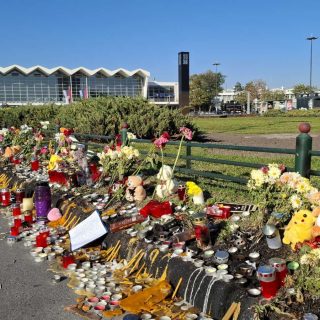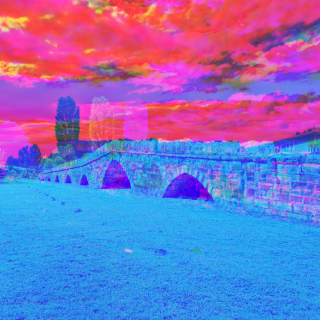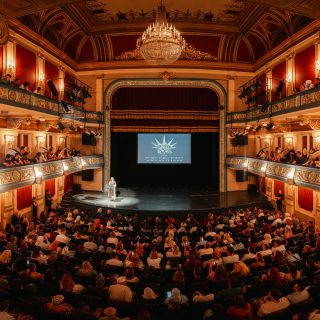Our author, Dardan Hoti, met a very strong woman, who turned her house into a museum to fight against oblivion.
No voices are heard besides lady of the house, Ferdonije Qerkezi. Although it is not her profession, now she works as a guide. Often, the voice betrays her, inside her very home, which she has now officially named a museum. The house is quiet and vacant of people. Yet it is filled with memories and pain that she alone can tell us. Perhaps this is a museum that she wished never existed. However, through this museum, she is educating and nurturing generations in Kosovo. With her powerful emotions and the house’s visual truth, she appears to be the saddest teacher in Kosovo.
She talks about the toys, the tools, the pictures and clothes now on display. Once, they were used by five other family members, who are no longer here. She recalls all five of them from March ’99. On 27 March, a group of masked police officers took them away. Along with the five men of her family, the masked police officers took six other men, eleven in total. Her four sons: Edmond, Artan, Ardian and Armend, and her husband Halim. Later, they took her nephew Vegim, her neighbors Skender Dylhasi with his son Myrteza. Together with them, they took their family friend Shpejtim Ymeraga and two sons from the Jetishi family who happened to be in their house, Shpend and Fatos.
She still does not know anything about three members of her family, apart from the bones of her two sons which she buried in 2005. She keeps looking for a sign from the others.
Although in grief, Ferdonije has decided to tell the world what happened in her home, in spite of the flow of tears she barely controls. She has never given up. From the day after the liberation of Kosovo to today she has been part of numerous protests and meetings, asking that the fate of the missing be uncovered. Her existence has been transformed into a living testimony of what happened in Kosovo 17 years ago. She continues to this day, telling and re-telling her story a thousand times over to all people who visit her museum throughout the year.
“Honestly speaking, each one of us gets used to a certain profession. This telling of the story has become a sort of profession for me,” she says. “I cannot count how many people have visited me in these 18 years. It is so hard, every time I tell this story I live through it again. How they were taken away, how they were sent away.”
Practices like this one by Ferdonije are moving the memory act from a mental state to an activity. Already, she is very good at it, telling the guests in detail what happened, without even forgetting the length of shirts her sons and husband had on. She talks about each photo inside frames and the inscriptions typed with a simple computer font, with the assistance of the association “Thirrjet e Nënave” (Mothers’ Cry). Each one has a story, and she has placed them one after the other.
At one corner of the room, some torn clothes are locked inside a glass shelf. The same clothes her two sons were wearing the day they were captured. Now, they are part of her museum, as a memory, relating to the desire of keeping real things. These memories now have created the relationship with the past and give off perceptions of the past. Another is a cradle in the middle of one of the rooms. It is the cradle that a long time ago, Mother Ferdonije used to rock her four sons, singing to them the most beautiful lullabies as a mother only can. The cradle is now empty but she once believed and hoped she would use it for her grandchildren.
“I changed nothing and I threw out nothing. Everything is here, and I look after these items. I kept even the smallest and simplest tools. The tools they used in their kebab shop, the toys, and everything else,” Ferdonije says.
In the drawers there are several litres of raki that her husband and sons had made with love. Cooking utensils from “Orex”, a restaurant owned by the Qerkezis. Glasses, watches and other items can be found on that shelf. Several pairs of shoes are placed on top of it.
There is a story from the past about each item. A past that was ominous for Ferdonije. Now, she draws her strength from the museum, which she transforms into an archive of memories. These archives now are being shared with and are becoming part of a collective memory.
“Thank God we are free to tell these stories. By concealing them, we never achieve anything. Everyone used to shut us up, and thankfully now we are free, we know we exist and we have stories to tell,” she says.
Although her body shakes by every word that comes out of her mouth, Ferdonije says she still has strength: “If it weren’t like this, this house would not exist.”
She has come across difficulties again. There is no professional individual or state support to look after her memories. The state has not yet assigned any person to work there. So far, the only assistance she has received from the institutions is the plaque placed at the entrance door by the Institute for the Monument Protection in Gjakova.
“I have nobody to look after here. According to the decision, an employee was supposed to be assigned to look after the place and a guide too. A year has passed, and nobody showed up, nothing has changed. I was told there is no budget. Also, the roof needs repairing. This is the first thing to be fixed. I was promised to, and I am waiting. There is a room that will serve as an office. The house heating needs work done on it too,” Ferdonije keeps telling.
“They will place clothes in vacuum packaging so they are not ruined. God only knows when this will happen. They brought the clothes when my eldest son was found. The clothes were unwashed. I washed the clothes myself and displayed them there,” she continues with her story.
Her stories are helping a bigger process in the society – that of reconciliation with the past. Projects like Mother Ferdonije’s museum cannot achieve the goals of transitional justice, but they can offer support. They have potential to create spaces for a democratic involvement and to encourage the engagement of younger generations in human rights.
They can present the past as something that should not be left to historians alone, but as something which, unless handled with sensitivity, may happen again.
Dardan Hoti
Dardan Hoti is a journalist and editor who has worked for various media in Kosovo for more than seven years. He was awarded with the Journalism Poverty Prize by the United Nations Kosovo Team in 2013.



